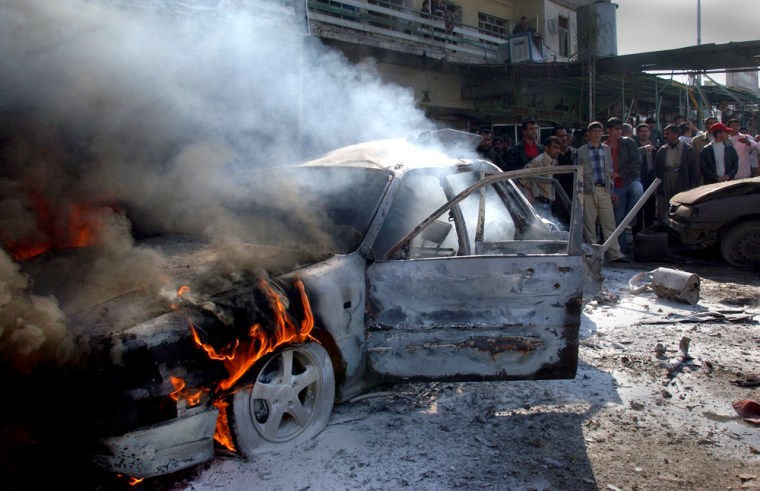A twin bombing left 11 dead in northern Iraq and U.S. aircraft went in action Saturday against Sunni insurgents west of Baghdad, as Iraqi officials claimed early success in the campaign to restore order in the capital.
The back-to-back blasts in the oil hub of Kirkuk broke a brief lull in major violence around the country as U.S. and Iraqi forces try to regain control of Baghdad and other key areas from gangs and militias.
Secretary of State Condoleezza Rice made an unannounced stop in Baghdad before heading for scheduled talks in Israel. She is the highest-level Washington official to visit Iraq since last month’s announcement of a coordinated sweep against militant factions.
“If in fact militias decide to stand down and stop killing innocent Iraqis ... that can’t be a bad thing,” Rice told reporters traveling with her.
“But how the Iraqis use the breathing space that that might provide is what’s really important” she said before meeting with Iraqi Prime Minister Nouri al-Maliki.
Militants lying low
Some believe militants have made a tactical retreat to avoid the stepped up pressure and could regroup later. The attacks in Kirkuk, about 180 miles north of Baghdad, again showed the willingness of extremists to strike busy urban areas for maximum bloodshed.
Police and witnesses said the first blast occurred near shops and a bus depot. Minutes later, a suicide car bomber attacked the same area. Terrified shoppers fled screaming in panic amid burning cars and debris. A restaurant owner lay screaming on the sidewalk, his body soaked with hot cooking oil after one of the blasts hurled him onto the curb.
Eleven people were killed in the two blasts and 65 were wounded, police Brig. Gen. Sarhat Qader said. Sunni Arabs and Kurds have laid rival claims on Kirkuk and its oil wealth.
Kirkuk is a major oil center with a mixed population of Kurds and Sunni and Shiite Arabs. On Feb. 3, a series of car bombs in the city killed two people and injured 30.
U.S. launches strikes in Ramadi
In Ramadi, a Sunni insurgent hotbed 70 miles west of the capital, U.S. jets strafed gunmen after they ambushed a U.S. patrol, said 2nd Lt. Roger Hollenbeck, a Marine spokesman. Hours later, U.S. aircraft destroyed a car with gunmen who were trying to escape after they attacked an Army patrol, Hollenbeck said.
There were no U.S. casualties, but Hollenbeck said eight insurgents were killed — four in each attack.
The attacks north and west of the capital contrasted with a lull in major violence in Baghdad as U.S. and Iraqi forces try to regain control from sectarian militias and criminal gangs.
Tightened security in capital
In Baghdad, new checkpoints were set up around the city, creating long traffic jams as vehicles were thoroughly searched. Iraqi tanks pushed into districts that recently were ruled by roaming gunmen and militant groups.
Violence in Baghdad has dropped off sharply since the military push began earlier this week. U.S. military planners, however, caution that any attempt to stabilize Baghdad could take months and it’s likely militants will not leave without a fight.
“We are very optimistic,” said U.S. Embassy spokesman Lou Fintor. Then he quickly added: “Things aren’t going to change overnight.”
Washington has pledged 21,500 additional troops for the operation, which is expected to reach a total of 90,000 U.S. and Iraqi forces.
“I would say that it is way too early to establish any trends,” Lt. Col. Chris Garver, a U.S. military spokesman, said Friday. “We’ve just started to focus our operations. We have months to go to see if we are going to succeed or not.”
Militias, insurgents lying low?
Maj. Gen. Joseph Fil, commander of U.S. forces in Baghdad, attributed the reduction in violence not only to the increased security presence but also to an apparent decision by the militias and insurgents to lay low for a while.
“But make no mistake, we do not believe ... that’s going to continue, and we do expect there are going to be some very rough, difficult days ahead,” Fil said. “And this enemy knows how — they understand lethality and they have a thirst for blood like I have never seen anywhere before.”
The U.S. military said Saturday that a U.S. Marine was killed during combat operations in western Anbar province. The Marine, who was assigned to Multinational Forces-West, died Friday, the statement said, but no further details were released.
The death was the first reported among U.S. forces since Wednesday when five soldiers were killed — all but one of them in Diyala province northeast of Baghdad.
